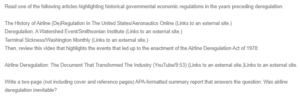Was Airline Deregulation Inevitable?
The airline industry is one of the most lucrative industries in the transport sector, attracting many private investors. The profitability of the industry is, however, dictated by the ability to use the shortest routes to save on fuel, while transporting passengers to different countries and adjusting prices based on the changes in the demand for airline services and oil prices. Airline deregulation was, therefore, inevitable because past regulations had limited the profitability of the industry by placing airline owners and investors in a disadvantaged position in different ways. For instance, the Civil Aeronautics Board put various restrictions on airlines by regulating what most customers benefited from in the airline industry. The board awarded new routes to airlines, hence limiting their entry into new markets, regulated the schedules that airlines would use to fly and regulated the fares that passengers could pay (Delta Air Transport Heritage Museum, 2007). This put a major restriction on the expansion of the airlines into new markets. The emergence of globalization and people’s need to travel to different countries for business and leisure could, therefore, not be met, hence, creating a need for deregulation to give airlines the freedom to explore new routes and control passenger prices to facilitate effective expansion into new markets (Sinha, 2019). The government could no longer control the industry because the increase in airline industries gave them power to demand better control of the industry because boycotts or strikes would have a major impact on not only the airline industry but also the United States’ business industry. It, therefore, became inevitable to grant airline companies autonomy to control the most important aspects of the industry, such as routes, fares, flight schedules, and market entries. Hire our assignment writing services in case your assignment is devastating you.
The development of the airline industry over the years was also characterized by increased competition as more companies joined the industry due to its lucrativeness. There was also a rise in the number of travelers moving from different parts of the world to the United States in search of better opportunities. People were also travelling from the United States to different parts of the world for business, tourism, missionary activities, and the provision of medical services. The government could, therefore, not restrict the expansion of airline companies to new markets. As a result, it was unavoidable to prevent the government from controlling market entries, routes, flight schedules, and fares, allowing airlines to expand their routes, charge competitive prices, and enter foreign markets previously dominated by Pan American World Airways. Deregulation would also secure the future of the airline industry by allowing more people to use airline services due to the rise of low-cost airlines such as JetBlue and Southwest (McDermott, 2017). There was additionally a need to improve the quality of services offered by airlines, thus making deregulation inevitable because the increase in competition would force them to adopt various strategies such as improving the quality of services, flying through different routes, increasing the number of flights per day, and setting competitive prices to maintain a competitive advantage. Airlines also had to grow by expanding their market share, and this could only be achieved by exploring new markets, especially in developing countries where the airline industry was not well-developed. The United States government could, therefore, not control airline services in markets beyond their jurisdiction, further increasing the inevitability of deregulation.
References
Delta Air Transport Heritage Museum. (2007). Deregulation: A watershed event. National Air and Space Museum. https://airandspace.si.edu/exhibitions/america-by-air/online/jetage/jetage08.cfm
McDermott, J. (2017). The history of airline (De)Regulation in the United States. Aeronautics – Aviation News and Media. https://aeronauticsonline.com/the-history-of-airline-deregulation-in-the-united-states/
Sinha, D. (2019). Effects of airline deregulation in the US. Deregulation and Liberalisation of the Airline Industry, 121-148. https://doi.org/10.4324/9781315191867-8
ORDER A PLAGIARISM-FREE PAPER HERE
We’ll write everything from scratch
Question

Was Airline Deregulation Inevitable
Read one of the following articles highlighting historical governmental economic regulations in the years preceding deregulation:
The History of Airline (De)Regulation In The United States/Aeronautics Online (Links to an external site.)
Deregulation: A Watershed Event/Smithsonian Institute (Links to an external site.)
Terminal Sickness/Washington Monthly (Links to an external site.)
Then, review this video that highlights the events that led up to the enactment of the Airline Deregulation Act of 1978:
Airline Deregulation: The Document That Transformed The Industry (YouTube/9:53) (Links to an external site.)Links to an external site.
Write a two-page (not including cover and reference pages) APA-formatted summary report that answers the question: Was airline deregulation inevitable?

